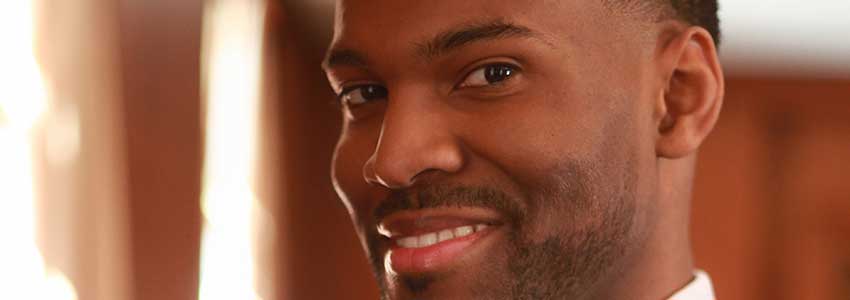“I’m an expert in my field. I have broken ground. I have made novel contributions. I’ve done it. I really have done it.”
The news is still settling in for Devan Donaldson. While Devan doesn’t graduate until May, he’s leaving Ann Arbor now for Bloomington, Indiana where he begins a tenure track position as an Assistant Professor in the Department of Information and Library Science in the School of Informatics and Computing at Indiana University. He says, “I’m under no false notion that this is truly amazing. To have a job before graduating is extraordinary. I know this is rare; it doesn’t usually happen like this. However, my whole time here, this was my dream. My dream has come true.”
Devan is a digital curation and preservation researcher. He says, “While at Michigan, I took the opportunity to learn about as many different research methods and designs as possible. The research methods I learned were directly impactful for my dissertation research. I also learned by doing. Consequently, I have seven publications. Employers have seen that as very attractive.”
He says the ambitious nature of his dissertation, which involved multiple studies and a complex research methodology, garnered significant attention. Devan’s dissertation focused on constructing and validating a psychometric instrument for measuring document trustworthiness perception within the context of a digital archive. His study centered on the concept of trustworthiness, both how users perceive trustworthiness and how trustworthiness can be measured.
Using the complex methodology of scale development, Donaldson’s dissertation is actually comprised of three separate studies that built upon each other. The first study defined the concept of trustworthiness from the perspective of actual users (i.e., genealogists) of digitized archival documents (e.g., digitized marriage, death, and birth records) preserved by the Washington State Digital Archives. The second study used the responses of participants during the first study to generate survey items for participants to evaluate during the second study. After collecting these data, he performed a series of statistical analyses to determine which survey items would be best suited in a scale for measurement of trustworthiness perception, which he named the Digitized Archival Document Trustworthiness Scale or DADTS. In a third study, Donaldson validated the DADTS with a different sample of users—members of the Genealogical Society of Washtenaw County (GSWC). He says, “Repository trustworthiness is one of the biggest questions facing digital curators today, and many are studying it. I wanted to know more about trustworthiness at the document level within the context of repositories that ought to be considered trustworthy, because document trustworthiness perception might be a variable affecting repository trustworthiness perception.” Development of standards for trustworthy digital repositories has been ongoing in the field of digital curation. In 2012, two international standards were approved. Devan wants to play a more active role in audit and certification process of trustworthy digital repositories as well as create a deeper understanding of users’ perspectives regarding the trustworthiness of digital repositories and their content.
Devan received an undergraduate degree from the College of William and Mary and a Master’s from the University of North Carolina at Chapel Hill. While UNC had a strong program in information and library science, Devan came to U-M in part because he recognizes the value of going to different schools, increasing your network, and getting exposure to new ideas. He was drawn to Michigan because of the faculty research in his field and the quality and strength of the program and of the University overall.
As a Rackham Merit Fellow, Devan attended the Summer Institute (SI) before beginning his doctoral program. He says, “My first experience at U-M was in SI, and that was a really great experience. There were no black men in my program at the time, but SI gave me an opportunity to meet people of color in other programs. I felt very comfortable there. The University of Michigan is a great place to be a graduate student. By virtue of being a grad student, I have access to all these resources. It is so easy to get your hands on the resources you need here. The people and students here are really smart; I always have really rewarding conversations about research. This is a strong intellectual environment. My friends are becoming the world’s best physicists, psychologists, pharmacists, medical doctors, political scientists, social workers, lawyers, and teachers; they are doing really great, cutting edge things.”
Devan was on the executive board of the Students of Color of Rackham (SCOR) and talks about that group as having been a great community for him. He says, “We organized a lot of professional, academic, and social activities. We built a strong community of scholars of color across the entire campus.”
“I’m thankful for the Rackham programs that provide services to graduate students and graduate students of color. I really depended on those resources and support to navigate the grad student experience, to enhance it, and to find that work/life balance. There’s a lot of work that goes on behind the scenes, and I’m not sure how many students come back and tell Rackham administration and staff that their work really matters. Students need all of this support because getting a Ph.D. is so difficult in so many ways. In order to make it doable, you need the support system Rackham provides.”
We at Rackham wish Professor Donaldson success and happiness as he embarks on this next phase of his career!

